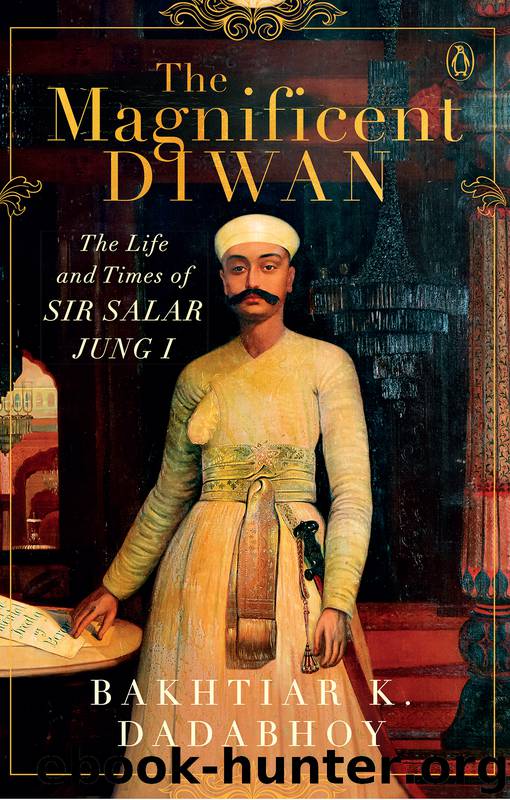The Magnificent Diwan by Bakhtiar K Dadabhoy

Author:Bakhtiar K Dadabhoy [Dadabhoy, Bakhtiar K]
Language: eng
Format: epub
ISBN: 9789353056773
Publisher: Penguin Random House India Private Limited
Published: 2019-12-04T00:00:00+00:00
A FUTILE ATTEMPT
Salar Jung had tasted success with the loan floated in London in June 1875. He now sought to replicate that success with another loan for the extension of the railway up to the Godavari and Chanda. In October 1875, Salar Jung authorized the company to increase its capital to the extent of Rs 1 crore and to renew negotiations, with Keay’s help, with foreign capitalists in England to raise money there. In March 1876, the company authorized a banker to represent it, who in turn appointed Smith, Fleming & Company for the purpose. The loan was for extension of the railway line up to the Godavari via Warangal and Singareni, with a northern branch to Chanda.
Even as Salar Jung was on his way to England (discussed in detail in chapter 12), Smith, Fleming & Company approached Salisbury once again for permission to raise money in England through a public issue. The senior partner, John Fleming, marshalled the relevant statistical data to convince the Secretary of State as to the value of the proposed extension. Even the GIP Railway would benefit since Singareni coal would be cheaper than the imported coal used by it. The claim was justified, but Salisbury refused to commit without referring the matter to the Government of India, suggesting that funds might be provided if the proposals were found beneficial to the country.
The resident, Sir Richard Meade, who had succeeded Saunders, proved to be the biggest hurdle in this affair. Privately, he was convinced of the benefits of the extension. However, he resented the fact that Salar Jung was advised by Keay, who, in his opinion, was only interested in feathering his own nest, and opposed relaxation of the Act of 1797. Salar Jung discussed the issue with Meade on his return from England. He told him that it had been decided in 1870, with Lord Mayo’s concurrence, that the construction and working of future lines would be within the purview of the nizam’s government, and that the narrow gauge would be the most suitable for future extensions.
Salisbury, who initially opposed the scheme, later revised his opinion on pragmatic grounds. He thought that it would make Salar Jung pledge, by way of interest, all his surplus revenue, and prevent him from using it for military purposes. Also, the creditors in England would back the Government of India if ever it became necessary to bring Hyderabad under direct control. Salisbury also reckoned that since Salar Jung’s appeal for the restoration of Berar had been rejected, it would be a good idea to keep him happy with this small concession. Lytton held a similar view. He told Meade that since they had to suffer Salar Jung (since he could not be got rid of), it would be a good idea to humour him on matters of small consequence.
Meade said that since one-third of the loan money was to be deposited in London as a guarantee for the payment of 6 per cent interest, the nominal rate of 6 per cent would be increased.
Download
This site does not store any files on its server. We only index and link to content provided by other sites. Please contact the content providers to delete copyright contents if any and email us, we'll remove relevant links or contents immediately.
Fanny Burney by Claire Harman(26591)
Empire of the Sikhs by Patwant Singh(23069)
Out of India by Michael Foss(16842)
Leonardo da Vinci by Walter Isaacson(13306)
Small Great Things by Jodi Picoult(7112)
The Six Wives Of Henry VIII (WOMEN IN HISTORY) by Fraser Antonia(5493)
The Wind in My Hair by Masih Alinejad(5085)
A Higher Loyalty: Truth, Lies, and Leadership by James Comey(4946)
The Crown by Robert Lacey(4802)
The Lonely City by Olivia Laing(4796)
Millionaire: The Philanderer, Gambler, and Duelist Who Invented Modern Finance by Janet Gleeson(4457)
The Iron Duke by The Iron Duke(4346)
Papillon (English) by Henri Charrière(4251)
Sticky Fingers by Joe Hagan(4185)
Joan of Arc by Mary Gordon(4092)
Alive: The Story of the Andes Survivors by Piers Paul Read(4017)
Stalin by Stephen Kotkin(3955)
Aleister Crowley: The Biography by Tobias Churton(3628)
Ants Among Elephants by Sujatha Gidla(3459)
